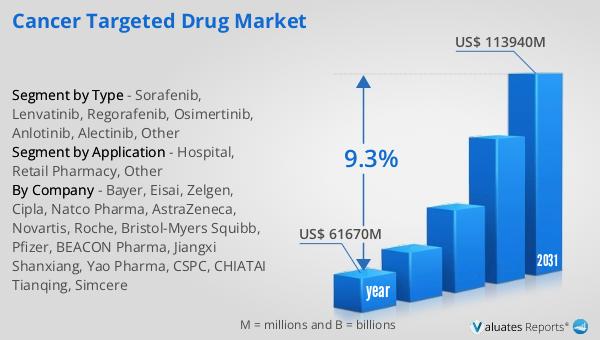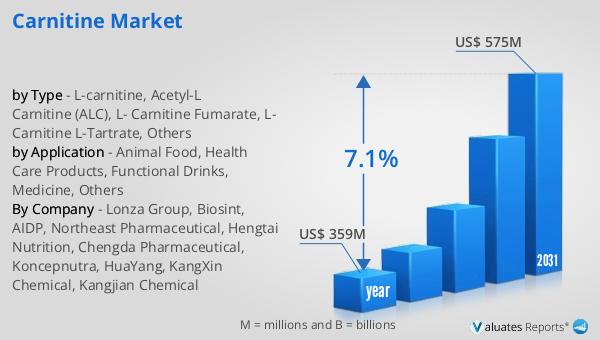What is Global Cancer Targeted Drug Market?
The Global Cancer Targeted Drug Market is a specialized segment of the pharmaceutical industry focused on developing medications that specifically target cancer cells while minimizing damage to normal cells. These drugs are designed to interfere with specific molecules involved in the growth, progression, and spread of cancer. Unlike traditional chemotherapy, which can affect both healthy and cancerous cells, targeted therapies aim to attack cancer cells more precisely, thereby reducing side effects and improving patient outcomes. This market has seen significant growth due to advancements in biotechnology and a deeper understanding of cancer biology. The increasing prevalence of cancer worldwide, coupled with the demand for more effective and less toxic treatment options, has driven research and development in this field. As a result, numerous targeted therapies have been approved for various types of cancer, offering hope to patients and healthcare providers alike. The market is characterized by a high level of innovation, with pharmaceutical companies investing heavily in research to discover new targets and develop novel drugs. This focus on precision medicine is expected to continue driving the growth of the Global Cancer Targeted Drug Market in the coming years.

Sorafenib, Lenvatinib, Regorafenib, Osimertinib, Anlotinib, Alectinib, Other in the Global Cancer Targeted Drug Market:
Sorafenib, Lenvatinib, Regorafenib, Osimertinib, Anlotinib, and Alectinib are prominent drugs within the Global Cancer Targeted Drug Market, each playing a crucial role in the treatment of different cancer types. Sorafenib is a multi-kinase inhibitor used primarily for liver, kidney, and thyroid cancers. It works by blocking the action of enzymes that promote cell division and blood vessel growth in tumors. Lenvatinib, another multi-kinase inhibitor, is used for thyroid cancer, renal cell carcinoma, and hepatocellular carcinoma. It targets multiple pathways involved in tumor growth and angiogenesis, making it effective in slowing cancer progression. Regorafenib is similar in function, used for metastatic colorectal cancer, gastrointestinal stromal tumors, and hepatocellular carcinoma. It inhibits several protein kinases involved in tumor angiogenesis, oncogenesis, and the tumor microenvironment. Osimertinib is a third-generation epidermal growth factor receptor (EGFR) inhibitor used for non-small cell lung cancer (NSCLC) with specific EGFR mutations. It has shown efficacy in overcoming resistance to earlier EGFR inhibitors, providing a valuable option for patients with advanced NSCLC. Anlotinib is a newer multi-targeted tyrosine kinase inhibitor used for NSCLC, soft tissue sarcoma, and renal cell carcinoma. It targets various pathways involved in tumor growth and metastasis, offering a broad spectrum of activity against cancer cells. Alectinib is an anaplastic lymphoma kinase (ALK) inhibitor used for ALK-positive NSCLC. It has demonstrated effectiveness in patients who have developed resistance to crizotinib, the first ALK inhibitor approved for this indication. These drugs represent the diversity and complexity of targeted therapies available in the market, each with unique mechanisms of action tailored to specific cancer types and genetic profiles. The development and approval of these drugs highlight the progress made in personalized medicine, where treatments are increasingly based on the genetic makeup of individual tumors. This approach not only improves the efficacy of cancer treatment but also reduces the likelihood of adverse effects, as therapies are designed to target cancer cells more precisely. The ongoing research and development in this field continue to expand the arsenal of targeted therapies, offering new hope for patients with various forms of cancer. As the understanding of cancer biology deepens, the potential for discovering new targets and developing innovative drugs remains vast, promising further advancements in the Global Cancer Targeted Drug Market.
Hospital, Retail Pharmacy, Other in the Global Cancer Targeted Drug Market:
The usage of the Global Cancer Targeted Drug Market spans various healthcare settings, including hospitals, retail pharmacies, and other specialized centers. In hospitals, targeted cancer drugs are often administered as part of a comprehensive treatment plan for patients with advanced or metastatic cancer. Hospitals provide the necessary infrastructure and expertise for the administration of these therapies, which may require specialized equipment and monitoring. Oncologists in hospital settings can closely monitor patients for side effects and adjust treatment regimens as needed, ensuring optimal outcomes. The availability of multidisciplinary teams in hospitals also facilitates a holistic approach to cancer care, integrating targeted therapies with surgery, radiation, and supportive care. Retail pharmacies play a crucial role in the distribution of oral targeted cancer drugs, which patients can take at home. This accessibility allows patients to maintain their treatment regimen without frequent hospital visits, improving their quality of life. Pharmacists in retail settings provide essential counseling on medication adherence, potential side effects, and drug interactions, supporting patients in managing their treatment effectively. The convenience of obtaining medications from retail pharmacies also reduces the burden on healthcare facilities, allowing them to focus on patients requiring more intensive care. Other specialized centers, such as cancer treatment clinics and research institutions, also utilize targeted cancer drugs as part of clinical trials and experimental therapies. These centers are at the forefront of innovation, exploring new drug combinations and treatment protocols to improve patient outcomes. Participation in clinical trials offers patients access to cutting-edge therapies that may not yet be widely available, providing hope for those with limited treatment options. The collaboration between pharmaceutical companies, research institutions, and healthcare providers is essential in advancing the development and application of targeted cancer therapies. This synergy ensures that new drugs are rigorously tested and evaluated for safety and efficacy before becoming part of standard treatment protocols. As the Global Cancer Targeted Drug Market continues to evolve, the integration of these therapies into various healthcare settings will play a critical role in improving cancer care and patient outcomes worldwide.
Global Cancer Targeted Drug Market Outlook:
The global market for Cancer Targeted Drugs was valued at approximately $61.67 billion in 2024 and is anticipated to grow to a revised size of about $113.94 billion by 2031, reflecting a compound annual growth rate (CAGR) of 9.3% during the forecast period. This growth is indicative of the increasing demand for targeted therapies as a more effective and less toxic alternative to traditional cancer treatments. In comparison, the global pharmaceutical market was valued at $1.475 trillion in 2022, with a projected CAGR of 5% over the next six years. This broader market encompasses a wide range of therapeutic areas, including cancer, cardiovascular diseases, and infectious diseases, among others. Meanwhile, the chemical drug market, a subset of the pharmaceutical industry, was estimated to grow from $1.005 trillion in 2018 to $1.094 trillion in 2022. The growth of the Cancer Targeted Drug Market outpaces that of the overall pharmaceutical and chemical drug markets, highlighting the significant investment and innovation in this area. The focus on precision medicine and the development of drugs that target specific cancer pathways are key drivers of this growth, offering new hope for patients and healthcare providers in the fight against cancer.
| Report Metric | Details |
| Report Name | Cancer Targeted Drug Market |
| Accounted market size in year | US$ 61670 million |
| Forecasted market size in 2031 | US$ 113940 million |
| CAGR | 9.3% |
| Base Year | year |
| Forecasted years | 2025 - 2031 |
| Segment by Type |
|
| Segment by Application |
|
| By Region |
|
| By Company | Bayer, Eisai, Zelgen, Cipla, Natco Pharma, AstraZeneca, Novartis, Roche, Bristol-Myers Squibb, Pfizer, BEACON Pharma, Jiangxi Shanxiang, Yao Pharma, CSPC, CHIATAI Tianqing, Simcere |
| Forecast units | USD million in value |
| Report coverage | Revenue and volume forecast, company share, competitive landscape, growth factors and trends |
